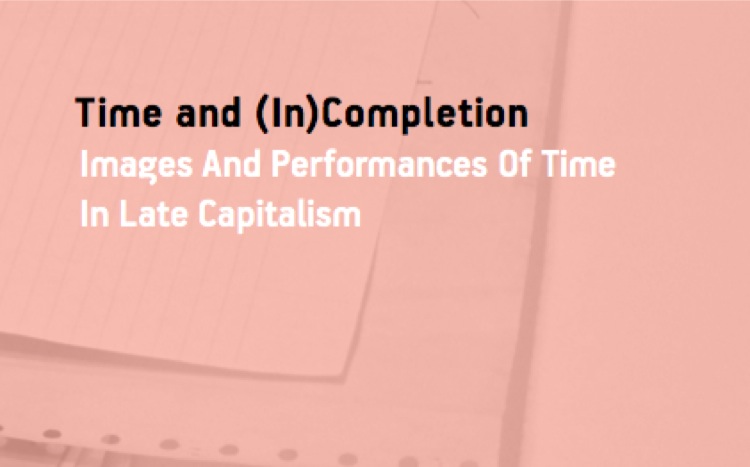18 / 06 / 2014
PUBLICATION
Download the book - "Time and (In)Completion – Images And Performances Of Time In Late Capitalism"

Our newest publication is available for download in PDF format!
Time and (In)Completion – Images And Performances Of Time In Late Capitalism (2014)
a reader of the symposium Broken Performances: Time and (In)Completion ed. Tomislav Medak, Goran Sergej Pristaš with Marie-Luise Angerer, Sean Cubitt, Karin Harrasser, Siniša Ilić, MASKA – Research Group (Nika Arhar, Katja Čičigoj, Martina Ruhsam, Katja Založnik), Tomislav Medak, Benjamin Noys, Goran Sergej Pristaš, Stephen Zepke Download the reader in PDF format here: Time and (In)Completion – Images And Performances Of Time In Late Capitalism  The reader Time and (In)Completion examines relations between the present-day modalities of time and the production of forms of life. "Time-scarcity” becomes a relevant topic not only from a social or biological perspective, but also as a dramaturgical and performative problem. Having developed in the 20th century in connection with the principles of Fordism and Taylorism (endless motion, speed of execution, oscillation between order and chaos, the regulated and the coincidental), the development of contemporary performance, especially dance, over the last two decades has reflected the deep changes brought about by post-Fordist modes of labor (cognitive and affective virtuosity, multi-layered temporality, proximity, collaboration processes, openness of work, etc.). In this sense, different choreographic practices should not be understood only as aesthetic practices, but also as wider social processes of distributing bodies in time and space. Simultaneously, the pervasive erosion of differences between screen technologies of cinema, television, and computers, results in new ideologies of speed and compression, which opens new possibilities to rethink elaborative slowness and strategies of recapitulation in performance and film. Therefore, it is important to open a debate on the logics of mutual translations of acquired insights and procedures from aesthetical to political processes (and vice versa) because the dominant modes of production impose consensus on the dominant images of time. editors: Tomislav Medak & Goran Sergej Pristaš publisher: BADco. proofreading: Žarko Cvejić editorial design: Katarina Popović printing: Tiskara Zelina d.d. print run: 300 ISBN: 978-953-56603-2-3 A CIP catalogue record for this book is available in the Online Catalogue of the National and University Library in Zagreb as 876776. This book is published within the project TIMeSCAPES, Images and performances of time in late capitalism, a partner project of BADco. (Zagreb), Maska (Ljubljana), Science Communications Research (Vienna), Walking Theory (Belgrade), Film-protufilm (Zagreb) and Academy Of Dramatic Arts, University of Zagreb. With the support of the Culture Programme of the European Union. This project has been funded with support from the European Commission. This publication reflects the views only of the author, and the Commission cannot be held responsible for any use which may be made of the information contained therein. The publication is supported by the Ministry of Culture of Republic of Croatia and the Office for Education, Culture and Sport of the City of Zagreb. Thanks to: Karin Harrasser, Multimedia Institute Zagreb, Jasna Žmak Zagreb, 2014
The reader Time and (In)Completion examines relations between the present-day modalities of time and the production of forms of life. "Time-scarcity” becomes a relevant topic not only from a social or biological perspective, but also as a dramaturgical and performative problem. Having developed in the 20th century in connection with the principles of Fordism and Taylorism (endless motion, speed of execution, oscillation between order and chaos, the regulated and the coincidental), the development of contemporary performance, especially dance, over the last two decades has reflected the deep changes brought about by post-Fordist modes of labor (cognitive and affective virtuosity, multi-layered temporality, proximity, collaboration processes, openness of work, etc.). In this sense, different choreographic practices should not be understood only as aesthetic practices, but also as wider social processes of distributing bodies in time and space. Simultaneously, the pervasive erosion of differences between screen technologies of cinema, television, and computers, results in new ideologies of speed and compression, which opens new possibilities to rethink elaborative slowness and strategies of recapitulation in performance and film. Therefore, it is important to open a debate on the logics of mutual translations of acquired insights and procedures from aesthetical to political processes (and vice versa) because the dominant modes of production impose consensus on the dominant images of time. editors: Tomislav Medak & Goran Sergej Pristaš publisher: BADco. proofreading: Žarko Cvejić editorial design: Katarina Popović printing: Tiskara Zelina d.d. print run: 300 ISBN: 978-953-56603-2-3 A CIP catalogue record for this book is available in the Online Catalogue of the National and University Library in Zagreb as 876776. This book is published within the project TIMeSCAPES, Images and performances of time in late capitalism, a partner project of BADco. (Zagreb), Maska (Ljubljana), Science Communications Research (Vienna), Walking Theory (Belgrade), Film-protufilm (Zagreb) and Academy Of Dramatic Arts, University of Zagreb. With the support of the Culture Programme of the European Union. This project has been funded with support from the European Commission. This publication reflects the views only of the author, and the Commission cannot be held responsible for any use which may be made of the information contained therein. The publication is supported by the Ministry of Culture of Republic of Croatia and the Office for Education, Culture and Sport of the City of Zagreb. Thanks to: Karin Harrasser, Multimedia Institute Zagreb, Jasna Žmak Zagreb, 2014
18 / 06 / 2014
PUBLICATION
Download the book - "Time and (In)Completion – Images And Performances Of Time In Late Capitalism"

Our newest publication is available for download in PDF format!
Time and (In)Completion – Images And Performances Of Time In Late Capitalism (2014)
a reader of the symposium Broken Performances: Time and (In)Completion ed. Tomislav Medak, Goran Sergej Pristaš with Marie-Luise Angerer, Sean Cubitt, Karin Harrasser, Siniša Ilić, MASKA – Research Group (Nika Arhar, Katja Čičigoj, Martina Ruhsam, Katja Založnik), Tomislav Medak, Benjamin Noys, Goran Sergej Pristaš, Stephen Zepke Download the reader in PDF format here: Time and (In)Completion – Images And Performances Of Time In Late Capitalism  The reader Time and (In)Completion examines relations between the present-day modalities of time and the production of forms of life. "Time-scarcity” becomes a relevant topic not only from a social or biological perspective, but also as a dramaturgical and performative problem. Having developed in the 20th century in connection with the principles of Fordism and Taylorism (endless motion, speed of execution, oscillation between order and chaos, the regulated and the coincidental), the development of contemporary performance, especially dance, over the last two decades has reflected the deep changes brought about by post-Fordist modes of labor (cognitive and affective virtuosity, multi-layered temporality, proximity, collaboration processes, openness of work, etc.). In this sense, different choreographic practices should not be understood only as aesthetic practices, but also as wider social processes of distributing bodies in time and space. Simultaneously, the pervasive erosion of differences between screen technologies of cinema, television, and computers, results in new ideologies of speed and compression, which opens new possibilities to rethink elaborative slowness and strategies of recapitulation in performance and film. Therefore, it is important to open a debate on the logics of mutual translations of acquired insights and procedures from aesthetical to political processes (and vice versa) because the dominant modes of production impose consensus on the dominant images of time. editors: Tomislav Medak & Goran Sergej Pristaš publisher: BADco. proofreading: Žarko Cvejić editorial design: Katarina Popović printing: Tiskara Zelina d.d. print run: 300 ISBN: 978-953-56603-2-3 A CIP catalogue record for this book is available in the Online Catalogue of the National and University Library in Zagreb as 876776. This book is published within the project TIMeSCAPES, Images and performances of time in late capitalism, a partner project of BADco. (Zagreb), Maska (Ljubljana), Science Communications Research (Vienna), Walking Theory (Belgrade), Film-protufilm (Zagreb) and Academy Of Dramatic Arts, University of Zagreb. With the support of the Culture Programme of the European Union. This project has been funded with support from the European Commission. This publication reflects the views only of the author, and the Commission cannot be held responsible for any use which may be made of the information contained therein. The publication is supported by the Ministry of Culture of Republic of Croatia and the Office for Education, Culture and Sport of the City of Zagreb. Thanks to: Karin Harrasser, Multimedia Institute Zagreb, Jasna Žmak Zagreb, 2014
The reader Time and (In)Completion examines relations between the present-day modalities of time and the production of forms of life. "Time-scarcity” becomes a relevant topic not only from a social or biological perspective, but also as a dramaturgical and performative problem. Having developed in the 20th century in connection with the principles of Fordism and Taylorism (endless motion, speed of execution, oscillation between order and chaos, the regulated and the coincidental), the development of contemporary performance, especially dance, over the last two decades has reflected the deep changes brought about by post-Fordist modes of labor (cognitive and affective virtuosity, multi-layered temporality, proximity, collaboration processes, openness of work, etc.). In this sense, different choreographic practices should not be understood only as aesthetic practices, but also as wider social processes of distributing bodies in time and space. Simultaneously, the pervasive erosion of differences between screen technologies of cinema, television, and computers, results in new ideologies of speed and compression, which opens new possibilities to rethink elaborative slowness and strategies of recapitulation in performance and film. Therefore, it is important to open a debate on the logics of mutual translations of acquired insights and procedures from aesthetical to political processes (and vice versa) because the dominant modes of production impose consensus on the dominant images of time. editors: Tomislav Medak & Goran Sergej Pristaš publisher: BADco. proofreading: Žarko Cvejić editorial design: Katarina Popović printing: Tiskara Zelina d.d. print run: 300 ISBN: 978-953-56603-2-3 A CIP catalogue record for this book is available in the Online Catalogue of the National and University Library in Zagreb as 876776. This book is published within the project TIMeSCAPES, Images and performances of time in late capitalism, a partner project of BADco. (Zagreb), Maska (Ljubljana), Science Communications Research (Vienna), Walking Theory (Belgrade), Film-protufilm (Zagreb) and Academy Of Dramatic Arts, University of Zagreb. With the support of the Culture Programme of the European Union. This project has been funded with support from the European Commission. This publication reflects the views only of the author, and the Commission cannot be held responsible for any use which may be made of the information contained therein. The publication is supported by the Ministry of Culture of Republic of Croatia and the Office for Education, Culture and Sport of the City of Zagreb. Thanks to: Karin Harrasser, Multimedia Institute Zagreb, Jasna Žmak Zagreb, 2014

